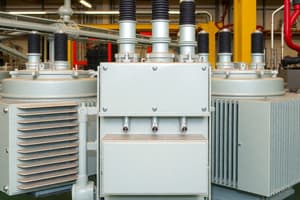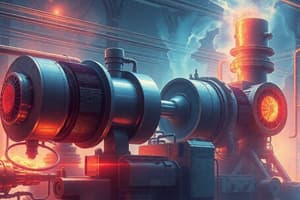Podcast
Questions and Answers
What is the function of the stator in an electrical machine?
What is the function of the stator in an electrical machine?
- Supports the rotor and allows it to rotate smoothly
- Carries electrical current
- Stationary part of the machine (correct)
- Rotating part of the machine
What is the basis for AC machine operation?
What is the basis for AC machine operation?
- Back-EMF
- Electromagnetic Induction (correct)
- Electromagnetic Torque
- Flux
What type of AC machine is most widely used?
What type of AC machine is most widely used?
- Synchronous Machine
- DC Generator
- Induction Machine (correct)
- DC Motor
What is the ratio of output power to input power?
What is the ratio of output power to input power?
What is the rotating part of the machine?
What is the rotating part of the machine?
What is the voltage induced in the windings by the rotating magnetic field?
What is the voltage induced in the windings by the rotating magnetic field?
Flashcards are hidden until you start studying
Study Notes
Types of Electrical Machines
- Alternating Current (AC) Machines:
- Synchronous Machines:
- Motoring mode: converts AC electrical energy to mechanical energy
- Generating mode: converts mechanical energy to AC electrical energy
- Induction Machines:
- Most widely used type of AC machine
- Simple and rugged construction
- Self-starting capability
- Synchronous Machines:
- Direct Current (DC) Machines:
- DC Motors:
- Separately Excited DC Motors
- Self-Excited DC Motors
- DC Generators:
- Separately Excited DC Generators
- Self-Excited DC Generators
- DC Motors:
Basic Components of Electrical Machines
- Stator: stationary part of the machine
- Rotor: rotating part of the machine
- Windings: coils of wire that carry electrical current
- Bearings: support the rotor and allow it to rotate smoothly
- Housing: outer casing of the machine
Operating Principles
- Electromagnetic Induction: the basis for AC machine operation
- Electromagnetic Torque: the rotational force that drives the machine
- Flux: the magnetic field that interacts with the windings
- Back-EMF: the voltage induced in the windings by the rotating magnetic field
Performance Characteristics
- Efficiency: the ratio of output power to input power
- Power Factor: the ratio of real power to apparent power
- Torque-Speed Characteristic: the relationship between torque and speed
- Speed Control: methods to control the speed of the machine, such as voltage control and frequency control
Types of Electrical Machines
- Alternating Current (AC) Machines consist of Synchronous Machines and Induction Machines
- Synchronous Machines can operate in Motoring mode (converts AC electrical energy to mechanical energy) and Generating mode (converts mechanical energy to AC electrical energy)
- Induction Machines are the most widely used type of AC machine, known for their simple and rugged construction, and self-starting capability
Basic Components of Electrical Machines
- The Stator is the stationary part of the machine
- The Rotor is the rotating part of the machine
- Windings are coils of wire that carry electrical current
- Bearings support the rotor and allow it to rotate smoothly
- The Housing is the outer casing of the machine
Operating Principles
- Electromagnetic Induction is the basis for AC machine operation
- Electromagnetic Torque is the rotational force that drives the machine
- Flux is the magnetic field that interacts with the windings
- Back-EMF is the voltage induced in the windings by the rotating magnetic field
Performance Characteristics
- Efficiency is the ratio of output power to input power
- Power Factor is the ratio of real power to apparent power
- Torque-Speed Characteristic is the relationship between torque and speed
- Speed Control involves methods to control the speed of the machine, such as voltage control and frequency control
Studying That Suits You
Use AI to generate personalized quizzes and flashcards to suit your learning preferences.




